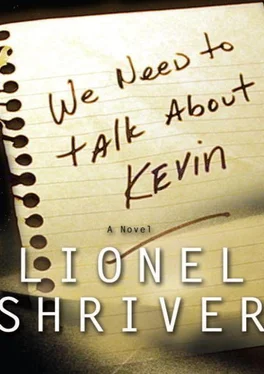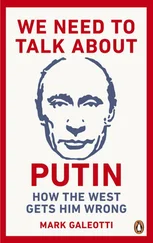Now, as they go, this story was rich, its moral agreeably clear. Little Kipland had bristled with “warning signs” that hadn’t been taken with sufficient seriousness. In middle school, he’d been voted “Most Likely to Start World War III.” He had recently given a class presentation on how to construct a bomb. In the main, he was predisposed to vent violent inclinations through the most innocuous of schoolwork. “If the assignment was to write about what you might do in a garden,” said one student, “Kipland would write about mowing down the gardeners.” Though in an eerie coincidence Kip Kinkel’s initials were also “KK,” he was so universally disliked by his schoolmates that even after his performance in the cafeteria they refused to give him a nickname. Most damningly of all, the very day before the shooting he had been arrested for possession of a stolen firearm, only to be released into his parents’ custody. So the word went out: Dangerous students give themselves away. They can be spotted, ergo, they can be stopped.
Kevin’s school had been acting on this assumption for most of that school year, though news of every new shooting jacked up the paranoia another notch. Gladstone High had taken on a battened-down, military atmosphere, except the McCarthyite presumption ran that the enemy was within. Teachers had been provided lists of deviant behaviors to look out for, and in school assemblies students were coached to report the most casually threatening remark to the administration, even if it “seemed like” a joke. Essays were combed for an unhealthy interest in Hitler and Nazism, which made teaching courses in twentieth-century European History rather tricky. Likewise, there was a supersensitivity to the satanic, so that a senior named Robert Bellamy, who was known by the handle “Bobby Beelzebub,” was hauled before the principal to explain—and change—his sobriquet. An oppressive literalism reigned, so that when some excitable sophomore screamed, “I’m gonna kill you!” to a volleyball teammate who dropped the ball, she was slammed into the guidance counselor’s office and expelled for the rest of the week. Yet there was no safe haven in the metaphoric, either. When a devout Baptist in Kevin’s English class wrote in a poem, “My heart is a bullet, and God is my marksman,” his teacher went straight to the principal, refusing to teach her class again until the boy was transferred. Even Celia’s primary school grew fatally po-faced: A boy in her first-grade class was kicked out for three days because he had pointed a chicken drumstick at the teacher and said, “Pow, pow, pow!”
It was the same all over the country, if the embarrassing little squibs in New York Times sidebars were anything to go by. In Harrisburg, Pennsylvania, a fourteen-year-old girl was strip searched— strip searched , Franklin—and suspended when, in a class discussion about School Shootings, she said she could see how kids who’d been teased might eventually snap. In Ponchatoula, Louisiana, a twelve-year-old boy was locked up in juvenile detention for an entire two weeks because his warning to his fellow fifth-graders in the cafeteria line that he’d “get them” if they didn’t leave him enough potatoes was construed as a “terrorist threat.” On a two-page web site, Buffythevampireslayer. com, an Indiana student posited a theory that must have crossed many a high-schooler’s mind from time to time that his teachers were devil worshipers; unsatisfied with his mere suspension, his teachers filed a federal lawsuit charging both the boy and his mother with defamation and infliction of emotional distress. A thirteen-year-old was suspended for two weeks because on a field trip to Albuquerque’s Atomic Museum, he had piped, “Are they going to teach us how to build a bomb?” while another boy got the third degree from a school administrator just for carrying his chemistry textbook. Nationwide, kids were expelled for wearing trench coats like Kipland Kinkel, or just for wearing black. And my personal favorite was a nineyear-old’s suspension after a class project about diversity and Asian culture, during which he wrote the fortune cookie message, “You will die an honorable death.”
Although Kevin was ordinarily tight-lipped about goings-on at his school, he went out of his way to deliver us tidbits of this escalating hysteria. The reportage had the intended effect: You were more afraid for him; I was more afraid of him. He enjoyed the sensation of seeming dangerous, yet clearly regarded the school’s precautions as farcical. “They keep this up,” he remarked once, and on this point he was astute, “they just gonna give kids ideas .”
It was an evening near graduation, a falling off the edge of childhood that for seniors always has a hint of the apocalyptic, and so might have made the faculty antsy even without Kip Kinkel’s help. After his usual dinner—a brutish nosh before the open refrigerator—Kevin cooled back in the den’s easy chair and delivered the latest installment: The entire student body had just been subjected to a “lockdown” in their classrooms for four periods straight while the police searched every locker and prowled the hallways with sniffer-dogs.
“What were they looking for, drugs?” I asked.
Kevin said lightly, “Or poems .”
“It’s this Jonesboro-Springfield nonsense,” you said. “They were obviously looking for guns.”
“What really slays me,” said Kevin, stretching out and spewing his words like cigarette smoke, “—if you’ll excuse the expression—is they sent a memo on the search procedure to the teachers? That loser drama teacher, Pagorski, left it on her desk, and Lenny saw it—I was impressed; didn’t know he could read. Anyway, word got around. Whole school knew this was coming. Kid with an AK in his locker had plenty of time to reconsider his piss-poor hiding place.”
I asked, “Kevin, didn’t any of your classmates object to this?”
“Few of the girls did, after a while,” he said airily. “Nobody could take a leak, see. Fact,” Kevin achieved a wheezy little laugh, “that donkeyface Ulanov wet herself.”
“Did anything make the administration especially alarmed? Or was it just, oh it’s Wednesday, why don’t we play with sniffer-dogs?”
“Probably an anonymous tip. They run a telephone hotline now, so you can rat out your friends. For a quarter, I could get out of Environmental Science any day of the week.”
“An anonymous tip from whom?” I asked.
“ Hello-o . If I told you who it was, then it wouldn’t be anonymous, would it?”
“Well after all that bother, did they even find anything?”
“Sure they did,” Kevin purled. “Shitload of overdue library books. Some old French fries that were starting to stink. One really juicy, evil poem had them going for while, till it turned out to be Big Black lyrics: This is Jordan, we do what we like… —Oh, and one more thing. A list.”
“What kind of list?”
“A hit list. Not ‘My Favorite Songs,’ but the other kind. You know, with THEY ALL DESERVE TO DIE scrawled at the top, big as life.”
“Jesus!” You sat up. “These days, that’s not funny.”
“Noooo, they didn’t think it was funny.”
“I hope they’re planning to give this kid a good talking-to,” you said.
“Oooh, I think they’ll do better than a talking-to .”
“Well, who was it?” I asked. “Where did they find it?”
“In his locker. Funniest thing, too. Last guy you’d expect. Superspic.”
“Kev,” you said sharply. “I’ve warned you about that kind of language.”
“ ’Scuse me. I mean Señor Espinoza . Guess he’s just bustin’ with ethnic hostility and pent-up resentment on behalf of the Latino people .”
Читать дальше












